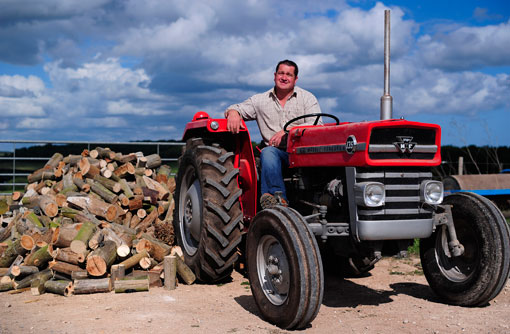FW Awards 2011: Young farmer of the Year finalist – Scott Bagwell

Scott Bagwell
Field Barn Farm, Dorset
There’s an unusual resident on the 850ha Dorset dairy, arable and sheep farm Scott Bagwell manages.
“That’s Ken,” he says as he drives past a cross buried amongst some trees on the top of a steep hill.
“He worked here for 46 years and he loved the farm so much he asked to be buried here when he died.”
It certainly shows commitment to your job to want to spend an eternity at your place of employment, but this farm obviously attracts very committed staff – as Scott shows.
Having joined the mixed enterprise as a relief milker aged just 16, Scott worked his way up the business before being appointed to farm manager in 2007 when the farm was bought by new owners.
Since then he has set himself the challenge of growing the size and the profits of the business, seeing the farm size almost triple in 2010 after the new buyers decided to buy a neighbouring farm and run it as a single operation.
The farm’s sudden growth would have daunted most people, but Scott has taken it all in his stride.
“We put a £1.2m investment plan in place in 2007 and built a slurry tower to comply with NVZ restrictions and put up a stock shed,” he says.
“I’m very lucky that I’ve been given the freedom to develop the farm into a sound commercial operation and make investments where I think they should be made.”
Scott has continued to develop the enterprise’s dairy unit and now runs 600 head of cattle (including young stock), with his predominantly Holstein Friesian herd producing 3m litres of milk a year.
Acknowledging that dairying is where his passion lies, he redeveloped the herringbone parlour to streamline milking, helping limit cost of production to 23p/litre – well below the 25.6p/litre he receives from milk processor Dairy Crest.
About 245 acres of grass and 180 acres of maize is planted each year for silage, while the farm also produces about 2,300 tonnes of wheat and 500 tonnes of malting barley, which is sold on the spot market.
As the farm expanded, Scott reorganised its layout to make sure the best soils were being used for the right purposes, changing crop rotations and putting land into the Higher Level Stewardship Scheme.
“It’s a lot of extra work, but it’s worth it. We have populations of grey partridge, skylarks and corn bunting here, as well as rare wild flowers and orchids. It’s good to promote the farm’s biodiversity and it generates us £40,000 a year.”
Assessing the farm’s land use means that Scott had to take some difficult decisions in terms of the 900-ewe flock. Recognising that the sheep farming system was labour-intensive, he rented hilly grazing land to a sheep farmer, guaranteeing a financial return on the land while freeing up the farm’s labour resources.
Scott has five staff working with him on the farm and he is keen to ensure all of them are able to work on each of the farm enterprises. He encourages them to go on training courses every year and the younger members of staff are sent to college on day release.
“We need flexibility – it’s crucial to the operation. I don’t think the industry does enough to bring youngsters in because they see farming as long hours with no room to develop.
“Many farms are understaffed because they’re under pressure to reduce costs, but to me staff are critical to taking the farms forward.”
As well as eventually increasing staff numbers further, Scott hopes to develop other enterprises on the farm, including building a biodigester.
“My philosophy is to make every acre do something. My target for the last three years was to make a profit before the Single Farm Payment and I look set to beat that.
“I love working here and I’m committed to making the farm as profitable and sustainable as I can.”
The judges liked:
• His commitment towards training and developing staff
• Excellent approach to environmental management
• Impressive drive to hit targets and improve standards
Farm facts
• Winterbourne Whitechurch, Dorset
• Farm size: 850 ha
• Dairy, arable and sheep enterprise
